It’s a term I coined to replace ‘non-monogamy’ as the blanket category of all non-exclusive, multi-partner relationships.
Play to hear the pronunciation
Over time, as I keep hearing and reading about ‘non-monogamy’, I have become annoyed with people using the term (with the implied ethics and consent consideration that adds a prefix to it). Describing an active practice which is positive and healthy, as the opposite of something else, is problematic, in my view.
Consider what it would feel like to call monoamory, non-polyamory?
What if we called all heterosexual people, non-queer?
Words have impact, and othering a group often starts with the way we use language.
I believe it’s time to upend this narrative, redefine the norm and see relationship dynamics as existing on a spectrum that includes single (by choice), monogamy, monogamish, mono-poly, open relationships, triads, quads, polycules, parallel poly, kitchen table poly, hierarchical and non-hierarchical poly, etc. etc.
Calling the practice of seeing multiple people in parallel, in whatever configuration, ethical non-monogamy, effectively implies that non-monogamy is normally unethical and therefore requires a qualifier. Ethics are subjective and not universal, so this is not a very helpful qualifier.
When most people only know of 2 dynamics (monogamy and cheating), it would make sense that you have to specify that an honest, transparent and consensual practice of non-monogamy is in fact ethical. However as the spectrum of relationship dynamics becomes more accessible and well known, I feel that speaking openly about dating multiple people, already implies both ethics and consent.
A step further would be to avoid defining the practice as what it is not (‘non-‘) and instead give it a neutral identifier such as ‘Multigamy‘. If ‘mono’ means 1 partner, ‘multi’ means multiple partners.
I would rather be defined by what I am, than by what I am not.
Designer relationships can work for the people involved, and not need critique or opinion from those not involved.
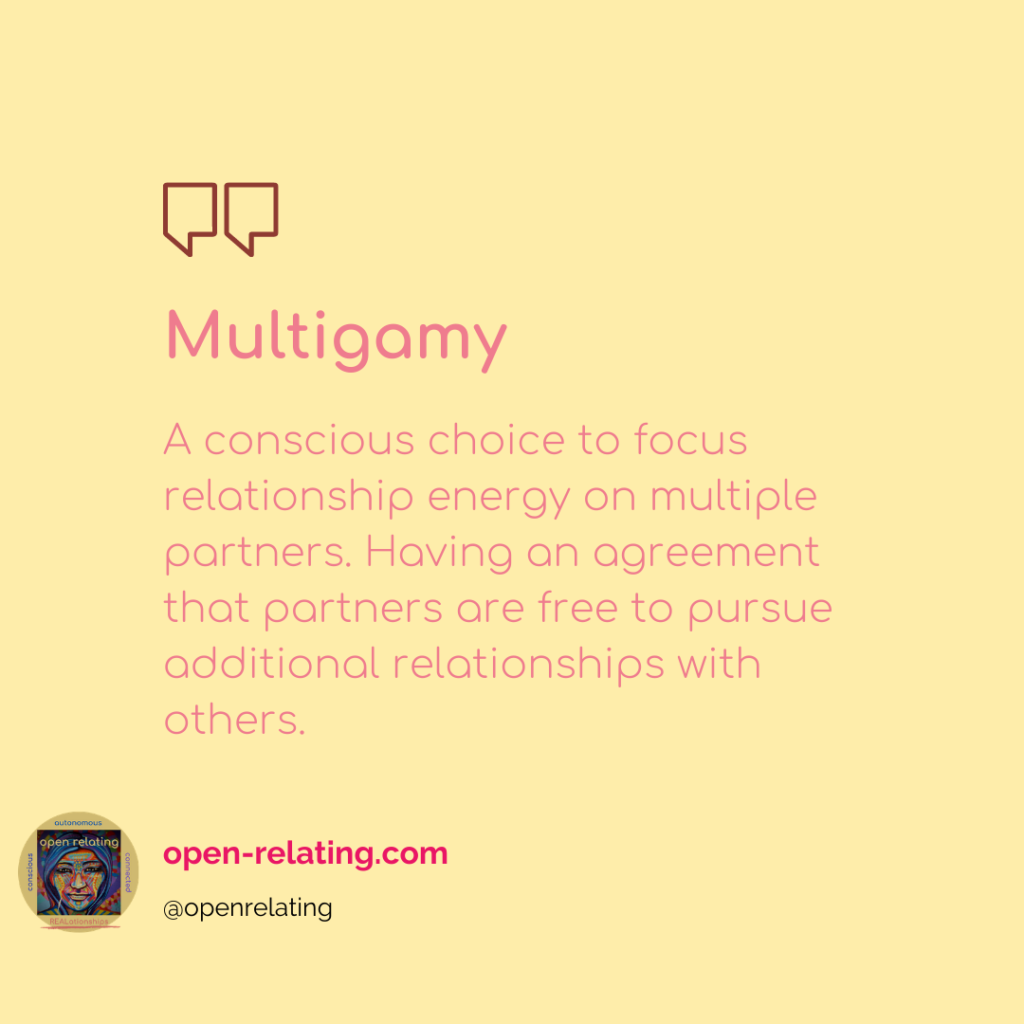
Mono = one | Multi = many | Gamy = relationship (marriage, originally)
Multigamy is a positive term describing all multiple-relationship dynamics. It has no negative implication like ‘non-monogamy’. Ethics and consent are a given, as just like in monogamy, some people behaving unethically do not represent the entire community.
Multigamy can look like many things. It doesn’t even mean those involved are polyamorous. They may be monoamorous & polysexual for example.
Here are some more common dynamics that fall under the umbrella of Multigamy:
- Swinging
- Mono-poly
- Hierarchical polyamory
- Triad (or thrupple)
- Open relationship
- Solo-poly
- Egalitarian polyamory
- Quad and larger polycules
If someone asks if you practice ethical or consensual non-monogamy, you can ask them if they practice ethical-monogamy. They might rethink their assumptions.
I was interviewed on a podcast called Practicing Polyamory where I explain in more detail why I use Multigamy instead of non-monogamy.
I also discuss this topic at length with Leanne of Polyphiliablog in this video.


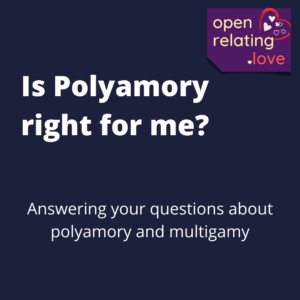

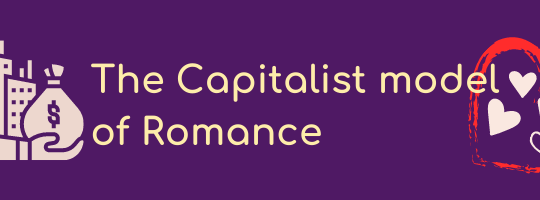
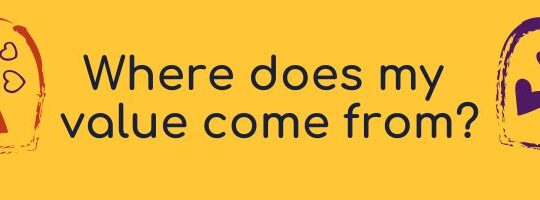
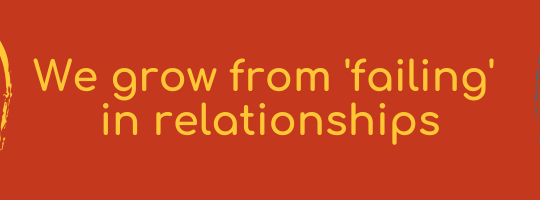
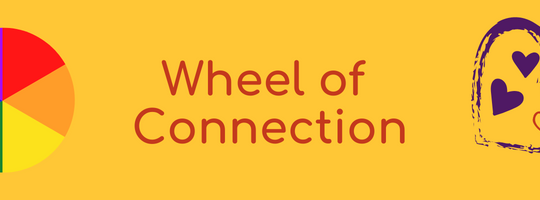
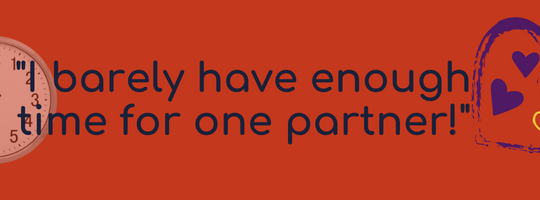
[…] no particular order, here are the reasons that I am polyamorous and choose multigamy as my preferred relationship dynamic. I will probably add to this list from time to time, as I […]
[…] Multigamy: Usually referred to as non-monogamy, often pre-ambled with ‘ethical’ or ‘consentual’, it is a relationship dynamic that includes more than two people. It is a conscious choice to spend time and energy on multiple partners. […]
[…] of feeling compersion. The fact is, compersion is NOT a requirement for practicing healthy, happy multigamy or polyamory. You should not be expected to feel compersive towards your partner, not should you […]
[…] long and we cover my own background with polyamory, compersion and jealousy and I explain what Multigamy […]
[…] behaviour. Most red flags are common to all relationship types and dynamics, be it monogamy or multigamy. Noticing one red flag does not necessarily mean that the relationship is doomed. Only that […]
[…] and other forms of multigamy (non-monogamy) have been getting a lot of exposure in recent years. They appear in mainstream TV […]
[…] took me some time to practice polyamory and multigamy in it’s myriad variations before I could definitively say, I have always been polyamorous but […]
[…] Roy uses the term Multigamy instead of […]
[…] (even when not aiming to procreate). Since the vast majority of people arrive at the concept of multigamy (non-monogamy) after initially practising monogamy for a long time, the process is always one of […]
[…] feel like it suited me and Polyamory suits me perfectly. If someone is polyamorous, then a multigamous (non-monogamous) relationship is the evolved choice for them. If someone is monoamorous, then […]
[…] have a few reflections for addressing these arguments against Multigamy or Polyamory. They come from years of experiencing both types of relationship dynamics, working […]
[…] See also – Ethical Non-monogamy and Multigamy. […]
[…] chat about Roy’s answer to this problem with his concept ‘Multigamy‘ and query why we add the qualifiers ‘ethical’ and/or ‘consensual’ to […]
[…] coach, I regularly work with couples who come to me at various stages of their journey into multigamy* (non-monogamy) with challenges, seemingly impossible conflicts, resentment and triggered fears. It […]
[…] in relationships is often unavoidable, especially in the early stages of practising multigamy. Power dynamics that affect multiple relationships, are often part and parcel of hierarchy. No […]
[…] feel like it suited me and Polyamory suits me perfectly. If someone is polyamorous, then a multigamous (non-monogamous) relationship is the evolved choice for them. If someone is monoamorous, then […]
[…] a reality of dating life when practicing various forms of multigamy (non-monogamy) that not everyone can be assumed to practice with the same values, do so ethically […]